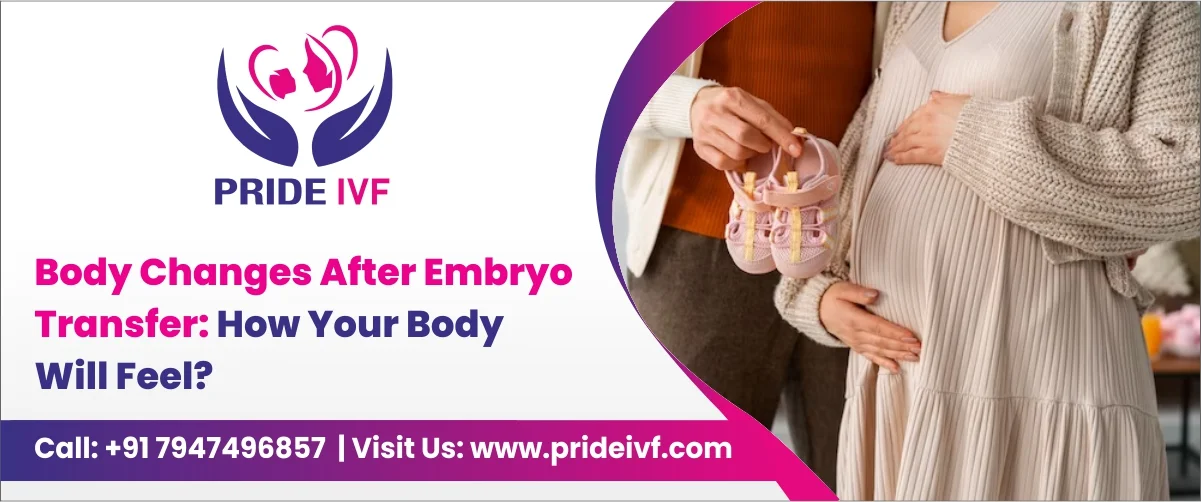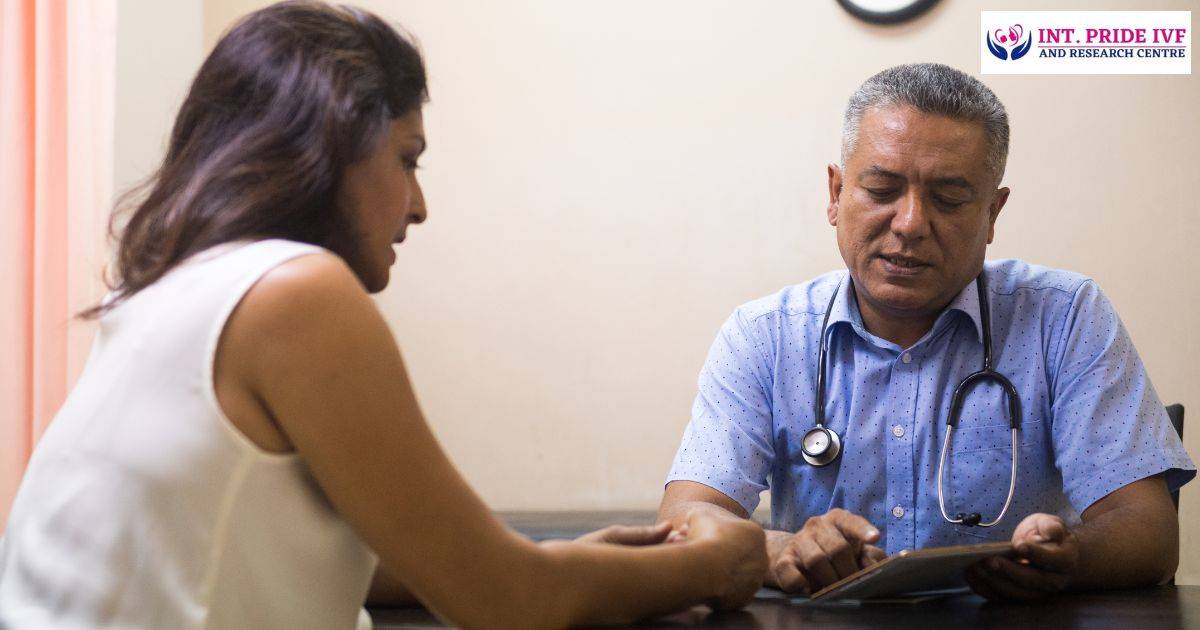Becoming a parent is a profound and emotional journey filled with hope and dreams. For those who have embarked on the path of assisted reproductive technology, such as in vitro fertilization (IVF), it’s a journey that often involves navigating a rollercoaster of emotions.
This voyage is characterized by its peaks and valleys, and one pivotal moment along the way is the embryo transfer. It’s a procedure that stirs up a unique blend of excitement and uncertainty.
In this blog, we’ll take a closer look at the emotional and physical body changes after embryo transfer that may unfold after embryo transfer, providing valuable insights into what to expect regarding your body’s response. Seek support from your loved ones and the dedicated professionals at International Pride IVF Centre In Delhi, who are here to accompany you every step of the way.




The Days Following Embryo Transfer
The moments following embryo transfer can be both thrilling and nerve-wracking. You’ve come so far in your fertility journey, and now you’re faced with the unknown. During these initial days, it’s common to experience a whirlwind of emotions, which is why it is important to analyze after embryo transfer day by day symptoms. From the moment the embryos are gently placed in your uterus, you’re on a path of hopeful waiting.
In the immediate post-transfer period, it’s essential to keep stress at bay. Easier said than done, right? But remember, stress can play a role in your body’s response to the procedure.
Try to find relaxation techniques that work for you, whether it’s meditation, gentle yoga (fertility yoga poses), or just taking time for yourself.
Physical Sensations
You may wonder how your body will react physically to the embryo transfer. One common experience of body changes after embryo transfer is mild cramping or discomfort. This can occur as your uterus responds to the presence of the embryos. It’s like your body saying, “Hey, something exciting is happening here!”
Bloating is another sensation you might encounter. Hormonal changes and the procedure itself can contribute to this feeling. It’s perfectly normal, and while it might not be the most comfortable sensation, it’s a sign that your body is adjusting.
Also Read: How Soon After Failed Frozen Embryo Transfer Can I Try Again?
Spotting and Bleeding
A somewhat surprising body changes after embryo transfer is spotting or light bleeding. It might seem worrisome, but it’s often nothing to be alarmed about. This spotting could be a result of the embryos implanting into the uterine lining. It’s called implantation bleeding, and it’s considered a positive sign in many cases.
However, not all spotting is related to implantation. Sometimes, it can be due to minor irritation from the procedure itself. It’s a good practice to keep track of the amount and duration of spotting and report it to your healthcare provider for reassurance and guidance.
Also Read: IVF Process Step By Step
Breast Tenderness
Changes in hormone is one of the common body changes after embryo transfer can also lead to breast tenderness. This is a common side effect and is usually temporary. The hormonal fluctuations can make your breasts feel sore or sensitive. To alleviate discomfort, consider wearing a supportive bra that provides extra cushioning.
Mood Swings
The hormonal changes that accompany IVF treatments and pregnancy can influence your mood. Don’t be surprised if you find yourself experiencing mood swings, from elation to anxiety, in a short span of time. Talking about your feelings with your partner or a close friend can help you cope with these fluctuations.
Increased Urination
Some individuals notice an increase in the frequency of urination after embryo transfer. This can be attributed to hormonal changes and increased blood flow to the pelvic region. Stay hydrated but be prepared for more trips to the restroom.
Lets get started
Gastrointestinal Changes
Hormonal changes can also affect your digestive system, leading to symptoms like constipation or diarrhea. Maintaining a balanced diet (after embryo transfer diet chart) and staying hydrated can help alleviate these issues.
Navigating Your Emotions
Let’s talk about emotions. Apart from other body changes after embryo transfer, you might also find yourself on an emotional rollercoaster. One moment, you’re overflowing with hope and excitement, and the next, you’re ridden with anxiety and uncertainty. This rollercoaster is entirely normal.
Your emotions are a reflection of the immense desire to become a parent and the challenges you’ve faced to get here. Be kind to yourself during this time. Share your feelings with a trusted friend, partner, or support group. Sometimes, just talking about what you’re going through can provide a sense of relief.
Understanding the Two-Week Wait
The “two-week wait” is a phrase familiar to anyone on the fertility journey. It’s the period between embryo transfer and the time when you can take a pregnancy test. Also look out for pregnancy symptoms after ivf. These two weeks can feel like an eternity. Every twinge, sensation, or lack thereof can be analyzed a hundred times.
It’s crucial to keep your mind occupied during this wait and wait for the positive signs after embryo transfer. Distract yourself with activities you enjoy, whether it’s reading, taking long walks, or binge-watching your favorite TV series. Remember that it’s okay to feel impatient and anxious, but try not to let it consume you entirely.
Managing Symptoms
Managing the physical symptoms after embryo transfer is all about self-care. If you’re experiencing cramping or discomfort, consider using a heating pad on a low setting to soothe those aching muscles. Staying hydrated and resting when you can also help your body adjust.
Keep in mind that the medications you’ve been prescribed as part of your fertility treatment can play a significant role in how your body feels. Side effects can vary, so follow your doctor’s recommendations closely, and don’t hesitate to reach out if you have concerns.
Potential Signs of Success
While it’s essential not to read too much into every physical sensation, some early signs may indicate a successful embryo implantation (when does implantation occur), which improve ivf success rates. These signs can be subtle and vary from person to person. You might notice increased fatigue, changes in taste or smell, or even mild nausea.
However, please remember that these signs are not definitive proof of pregnancy. They can also be side effects of the medications you’re taking. The only way to confirm a pregnancy is through a blood test or a home pregnancy test, as advised by your healthcare provider.
Knowing When to Reach Out to Your Doctor
Throughout this journey, your healthcare team is your lifeline. They’re there to answer your questions, provide guidance, and offer support. If you ever experience negative signs after embryo transfer or have concerns, don’t hesitate to contact your doctor. Trust your instincts and prioritize your health and well-being.
Conclusion
Embryo transfer marks a significant milestone in your extraordinary journey toward parenthood. It’s a moment that brings together a tapestry of physical sensations and a rollercoaster of emotions, forming a unique chapter in your life story. What’s vital to keep in mind is that no two paths to parenthood are alike; every individual’s experience is beautifully distinct.
Throughout the days and weeks following embryo transfer, it’s essential to practice self-compassion. The road you’re on may have its share of challenges, but it’s also illuminated by the shining beacon of hope, resilience, and the promise of new beginnings.
As you embrace this journey, remember that you don’t have to walk it alone. Their expertise and compassionate care are invaluable companions on this path to realizing your dream of parenthood.
So, take a deep breath, hold on to hope, and trust in the strength that has brought you this far. Your story is one of determination, love, and the limitless possibilities of the human heart. Embrace it, celebrate it, and keep moving forward with unwavering positivity and patience.
Your journey is a testament to the power of love and the boundless potential of your future family. Embrace it with open arms, for the best is yet to come.
FAQ
What is happening in your body after embryo transfer?
Your body experiences a number of physiological changes following an embryo transfer as it becomes used to the implantation procedure. With any luck, the embryo will implant into the uterine lining and start to grow once it is inside the uterus. Your body is undergoing hormonal changes as a result of the fertility drugs taken throughout the IVF procedure. In order to maintain the uterine lining and provide a loving environment for the embryo, progesterone levels rise. A minor cramping, bloating, or spotting sensation could occur when the embryo tries to implant. It is crucial to remember that symptoms can vary greatly, and the absence of symptoms does not always mean that something is wrong.
Is it normal to feel angry after embryo transfer?
After an embryo transfer, it is normal to feel furious or go through mood swings. Many things might be blamed for the emotional reaction, such as the hormone changes brought on by fertility drugs, the stress and worry of the IVF procedure, and the expectation of the result. It is critical to recognize that these feelings are a normal aspect of the reproductive process. A counsellor or therapist who specialises in fertility and emotional well-being may be able to provide support if anger or other strong emotions become overwhelming.
What does egg transfer feel like?
Though the process can differ from person to person, an egg transfer, also known as an embryo transfer, is a generally simple operation. The majority of women characterise the feeling as slightly uncomfortable but not painful. The embryo is inserted into the uterus during the surgery using a tiny catheter. As the catheter is implanted, you could experience some pressure or cramping, but these symptoms normally go away fast. Most women have the surgery in an office environment, and many return to their regular lives shortly after.
When can you hear the heartbeat in IVF?
Using a transvaginal ultrasound, the heartbeat of the embryo in an IVF pregnancy can typically be found between weeks 6 and 7. Around this time, an early ultrasound is usually performed to check for a heartbeat and evaluate the embryo’s progress. Depending on the particulars of each instance and the calibre of the ultrasound equipment, the precise timing may change. You will receive guidance regarding the timing of these crucial early scans from your obstetrician or fertility expert.
No white discharge after embryo transfer
Not all white discharge following embryo transfer is indicative of a problem. Each person experiences discharge differently, and variables including hormone fluctuations, hydration, and unique physiological reactions can all have an impact. White discharge can vary over the menstrual cycle and during pregnancy, and it is frequently linked to cervical mucus. A lack of discharge is usually not a sign of trouble if you have no other symptoms and your doctor has not expressed any concerns. However, it is advisable to talk to your healthcare physician if you have any concerns or have additional symptoms.
No symptoms after embryo transfer: Is that normal?
Since each person’s body reacts to embryo transfers differently, it is normal to experience no symptoms at all. Some women might not notice any changes, while others can suffer symptoms like cramps or spotting. The absence of symptoms does not always mean that the embryo transfer was successful or unsuccessful. The absence of pregnancy signs does not always indicate that the transfer was failed because they can take longer to manifest. See your fertility specialist again for a more thorough assessment and to address any worries you may have.




